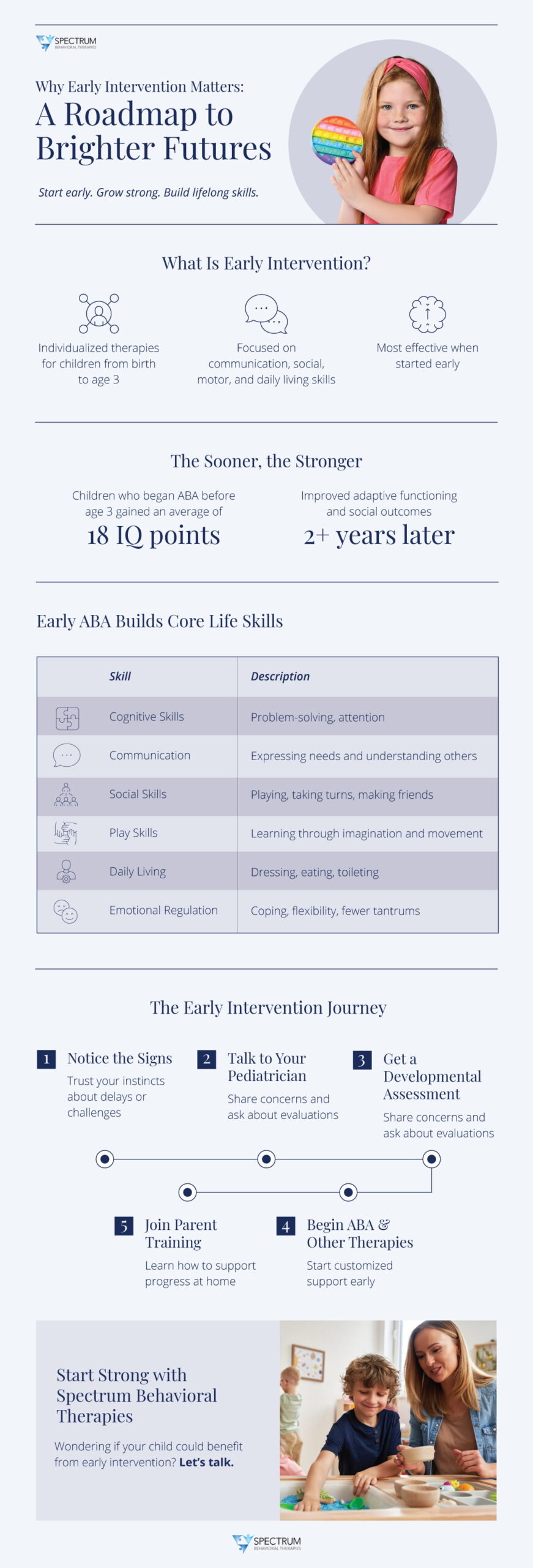When young children struggle to meet developmental milestones, parents often worry. Understanding the next steps and how to get help is vital to the potential for positive outcomes. We’ll explain why early intervention is important and why having your child assessed early is best.
What Is Early Intervention in Autism?
Early intervention in autism refers to enrolling children from birth up to three years old in various therapies to address developmental delays or disabilities. These therapies can include applied behavior analysis (aba), speech therapy, occupational therapy, etc. Intervening earlier in life can form a crucial foundational block for growth for children who need additional help.
Why Is Early Intervention Important for Autism?
Early intervention is important for autism because a toddler’s brain is moldable and open to learning. This concept is called neuroplasticity. It’s believed that the sooner a child gets help, the greater the opportunity to achieve developmental milestones.
Also, early intervention allows a child to practice various social and communication skills before spending a lot of time in public, such as in a school setting. Intervening early will allow the child to master foundational skills such as attending, following instructions, and responding to others so that they can spend school days learning their lessons as opposed to these basic skills. Children can spend school days learning their lessons instead of facing constant instructions, such as “sit down.”
To summarize, early intervention:
- Allows for greater growth and skill development
- Makes learning easier for the child
- Allows practicing skills early
- Improves daily life
- Helps families understand their child
- Closes the gap of developmental delay between the child and their peers
Benefits of Early Intervention in ABA Therapy
It’s proven that early intervention has reduced ASD severity in children, but what does this mean exactly? Review some of the key benefits of early intervention.
Achieving Better Skill Development
Because of the previously mentioned flexibility of a child’s mind, communication, social, motor, and cognitive skills will develop more easily and quickly when therapy starts sooner.
Learning Through Play
Children often learn through playing, so starting ABA therapy early allows therapists to use play to teach positive skills and behaviors. Using this method will make learning and maintaining various behaviors and skills feel more natural, improving the long-term results.
Preparing Children for School
Early intervention makes the transition to school easier for you and your child. Children can thrive in the classroom instead of finding it a source of negative feelings and frustration. Their academic performance will improve because they can focus on learning.
Creating Happier Children
When a child can understand and communicate their feelings, they live much happier lives. They won’t have to struggle with the skills required to care for themselves in age-appropriate ways.
Making Socialization Easier & More Enjoyable
Socialization is often a problem among children with autism. This issue can lead to difficulty making friends. Early intervention can prevent this by helping the child “catch up” to their peers, making interaction easier from an earlier age.

Benefits of Early Intervention for Families
Early invention can also improve the lives of the family members of children with autism. One key benefit is a lower stress level in your household.
Quality ABA services will include the family in the process so they can learn how to better interact with the child. This effort eases communication issues and the various problems that arise from them.
Spectrum Behavioral Therapies offers parent training so you interact more effectively with your child and maintain a supportive growing environment between sessions. This combined effort will increase the likelihood of behavior maintenance.
Long-Term Outcomes of Early Intervention
Many people wonder if early intervention actually offers long-term gains. One study of children with ASD found that early intervention helped improve various autism symptoms two years after having the intervention.
Here are the top three long-term outcomes of early intervention.
1. Persistent Behavioral Change/Skill Gain
All the changes that come with early intervention, whether skill development or behavior changes, persist even after the child is out of therapy. This success occurs because of repeated sessions and learning through play—the child grew up learning these skills. It becomes easier for children to continue to act desirably as they grow older instead of reverting to maladaptive behavior.
2. Living Independently
Because everything they learned feels natural to them, many ABA participants who have undergone early intervention can live independently as adults. They can do daily tasks, socialize, and follow instructions as needed to thrive in the adult world.
3. Living Independently
Early intervention creates a better quality of life for children. They can understand their emotions and triggers, socialize more easily, and comprehend instructions in different environments. A firm grasp of these concepts leads to better academic performance, higher rates of employment, and the development of close relationships with others.
Early intervention can also teach children better coping mechanisms, making them less likely to turn to maladaptive behaviors when stressed.

When Should You Start Early Intervention?
As mentioned, early intervention is available for children from birth to age three. However, it can be difficult for parents to tell if their child needs assistance.
If you notice any of the signs below, the best thing to do is talk to your pediatrician. They’ll be able to guide you to the next steps or determine whether it’s truly just a delay.
Signs of developmental delay include:
- Lack of eye contact
- No response to various facial expressions
- Not looking at objects when pointed towards them
- Not speaking words by 15 months old
- Not responding to their name
- No interest in talking to others
- Not playing with toys
- Rocking, flapping hands, and other tics
- Walking on toes for long periods of time
- Struggling with changes in routine
- Obsessing over a single object or interest
- Experiencing sensitivity to stimuli (smells, sounds, textures, etc.)
Learn More About Early Intervention at Spectrum Behavioral Therapies
Spectrum Behavioral Therapies creates a customized plan for each child under our care. We come together monthly with the parents, child, therapist, and supervisor to discuss what is and isn’t working and adjust plans as needed.
Now that we have covered why early intervention is important, you may be interested in exploring this option for your child. Contact us today to start the process.









